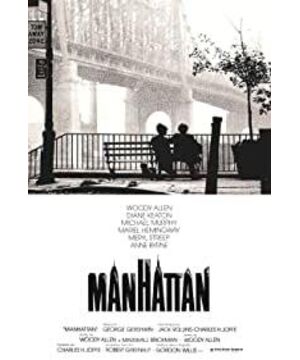In Woody Allen's shots, Manhattan is described as an indifferent and crowded city, every shot They all give people the feeling of being cramped. In the city's tavern, a few friends are drinking, the frame is full of several main characters, the topic is not speculative, and the words are full of hidden confrontation.
The director seems to want to use this cramped lens language to convey to us: In a crowded city, everyone's encounter, or even collision, is embarrassing and helpless. Woody Allen, who is good at digging out the elements of drama, seems to grasp the most obvious characteristics of "city" all at once.
The marriage broke down because the wife became gay, and the friends didn’t understand. The women I met again were "hedgehogs" full of self-protection consciousness. The TV station job was lost because of my own impulse—this is the image of a standard urbanite . Meryl Streep’s gay plot will soon remind us of the ROSS in "Six People". Maybe it’s a plagiarism from the latter, but I think it’s more of a common problem in a country that is too open to open anymore. .
Unfortunately, it seems to be the eternal theme of Woody Allen's films. The protagonist Isaac is 42 years old. He has endless troubles and a knot that can never be solved. Unlucky luck makes this old boy always complain about himself. His life, the people he meets, and the irrationality of this city, the embarrassment and ridiculousness of urbanites are projected in his words.
After getting acquainted with the woman who was a thorn, Isaac realized that the two people had strikingly similar impressions of the city: chaotic and unreasonable.
"The building is going to be demolished. I once called on people to resist this incident, lying under the building and trying to stop them from demolishing it, but a policeman stepped on my hand. Alas, the city is crazy!"
The lonely individual in the Manhattan metropolis is filled with the love for the entire city, the entire city’s culture, and even the feelings of living and dying together. Whether it is career failure or loneliness in life, Woody loves this city. He loves not only the joy and happiness of Manhattan, but also the depression and depression in this city.
The character in the film that can best reflect the sense of the city is the woman from a different city (I can't remember which city). When I appeared on the stage, I was talking about the art, culture, and all the affairs of the city, and I repeatedly reiterated that I had just arrived here. The words are full of tension and self-protection consciousness. This may be the ultimate reason for the indifference of the city. Everyone is careful to protect themselves, for fear of being considered by others as shallow and without independent opinions. This kind of uplifting dialogue has caused difficulties in communication between people. Therefore, Iraq It's easy to understand Sack's groaning complaints after seeing this woman for the first time.
However, the film tells us from the beginning that this is a romantic story, so love should be the main plot of the film. In the author's eyes, although the city is cold and cramped, there are still things he loves. Perhaps it is the indifference of the city that makes love stand out in a cold color.
What’s interesting is that the two love heroes’ understanding of each other is exactly what we learned about Manhattan through the film. Isaac’s surface is chattering, full of complaints about the city and what he has encountered, but this foreign woman slowly It turns out that this is a person with rich inner emotions and very kind heart, and Isaac's understanding of women is also from the beginning of a hundred people who look down on it, to the love after gradually stripping off the disguise. As a result, a city’s emotions expressed through characters are slowly revealed in front of us. The feelings for a city are the feelings for a lover. It is mixed with disgust to understanding, to love, and then to surprise, and finally becomes a habit. Various feelings.
There is also a more interesting character in the film, that is the 17-year-old girl Mary. If analyzed from a semiotic point of view, this girl symbolizes purity and persistence. In the film, Isaac’s attitude towards this girl is very interesting. He always complains that the age difference between the two people is too large, and tells Mary tirelessly: "Your life has not yet begun. In the future, you will meet someone who is a thousand times better than me. Man." After meeting Yell (the foreign woman), this feeling became stronger, but the rhetoric gradually became hypocritical as Isaac's feelings for Yell gradually warmed up. After Yale finally left him, Isaac felt very lonely and couldn't let his love life go unscathed, so he resumed his love offensive against the 17-year-old Mary. At the end of the film, those rhetoric is obviously very hypocritical, and the words and deeds are inconsistent, but this touches Mary-maybe there is still purity in the city? This ending is great! Leave the question to the audience.
The most important addition is Woody Allen's humor. Humor elements are ubiquitous in his films, but each element is not casually inserted, but has a very rigorous connotation. Give two examples:
One is that after Isaac expressed his feelings with Yale, there is a MV-style love scene. The two people are rowing on the lake. The scenery of the lake and the mountains are so colorful. Inside, there was an intoxicated expression on his face, but wait! What did you catch in your hand? When I took it up again, it was muddy. This bridge segment turned the whole splendid atmosphere into embarrassment and ridiculous. The director seems to want to use this little action to predict that the love between the two people will not go smoothly-it is too clever not to waste any visual element that can serve the theme.
There is also a paragraph, again without dialogue. Isaac took his son to go shopping. In front of the window, his son saw a huge model of a sailing boat. However, Isaac suggested that his son buy the smaller model. The shot was taken from the store. After a silent dispute between the two , The impatient father hit his son on the head, the son entered the store, but Isaac began to spend his money counting the money-the embarrassment and helplessness of the urbanites was vividly expressed.
View more about Manhattan reviews










